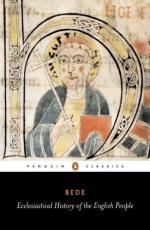|
This section contains 376 words (approx. 2 pages at 300 words per page) |
Encyclopedia of World Biography on Bede, St.
St. Bede (ca. 672-735), known as the Venerable Bede, was an English monk, scholar, and theologian. His works were the crowning cultural achievement in England in the 8th century, "the age of Bede."
Bede was born in Northumbria, near Jarrow. When he was 7, relatives brought him to the Benedictine abbey at nearby Wearmouth; he passed the remainder of his life at Wearmouth and later at a new monastery at Jarrow. The period during which Bede lived was the "golden age of English monasticism," and close relations with Rome and the papacy resulted in a free exchange of information and culture.
Bede's works are many and various; establishing their chronology with precision is difficult. He considered his major achievement to be his biblical commentaries, which were firmly rooted in traditional exegesis, with much use of allegory to expound scriptural meanings. He wrote two scientific treatises on chronology and the formation of the Church calendar, De temporibus (703) and De temporum ratione (725), to each of which was appended a chronicle of the ages of the world as established by God. Bede also wrote a number of saints' lives, full of edifying miracles, including two versions of the life of St. Cuthbert (ca. 704 and 721).
All of Bede's interests intersected brilliantly in the Historia ecclesiastica gentis anglorum (Ecclesiastical History of the English People), which he finished in 731. It is, in effect, a saint's life with the English nation as hero, and it illustrates the early medieval theological proposition that the workings of Divine Providence are visible in history. Bede's theme is the conversion of the Anglo-Saxons, after their settlement in Britain, by missionaries from Rome and Ireland. Exemplary miraculous passages illustrate the benefits derived by the English from heeding the message of the Gospel and the merits of those who devote their lives to propagating that message. Bede includes many documents giving important information about the early English Church, and he reveals his considerable narrative talents in many fascinating tales, such as that of Caedmon, the unlettered peasant who miraculously becomes the first religious poet in English.
Bede died at Jarrow in 735. He soon became a legend, revered for his holiness and learning. His greatest work, the Ecclesiastical History, was a constant model for historians throughout the Middle Ages.
|
This section contains 376 words (approx. 2 pages at 300 words per page) |


